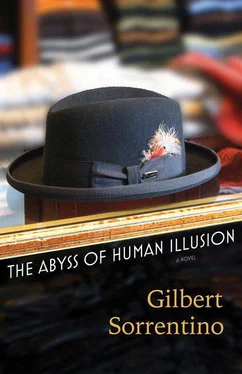He didn’t quite know what was happening to him, but something was happening to him, surely. Or had it happened already? Probably. Or had it been happening all along, as they say? Perhaps. It certainly was sharply reminiscent of what had happened to him — at least once — in the past. But what “past”? Yesterday? Two weeks ago? Nineteen forty-nine? Or longer ago than that? He was old enough to know that he’d forgotten many things that were once of urgent importance. What things? Had it happened in the days of Juicy Fruit and the Milano Restaurant, the latter long gone? And did they still make Juicy Fruit gum the same? What “sort” of thing had happened to him as he stood on the cold Manhattan street outside the Milano, his mouth packed with Juicy Fruit, his hand in his mother’s hand; they were waiting for his father? They were waiting for his father. Is that all that happened? What did that have to do with what was happening to him now? And did this bring to mind the Milano? The cold streets, the pinkish wash of the sky over the Hudson River? Juicy Fruit? The Milano. The Milano. It had no significance for him, yet he remembered it, only as a name, though. Nothing more specific, save for the open boxes of cigars in the glass case by the cash register. His father bought a cigar and talked to the owner in Italian as he paid him. Is that what happened? Did he ever actually go to the Milano, or was the place existent only in his mother’s stories? But he had had a mouth full of Juicy Fruit. Is he becoming a little hazy in his mind? He is. What is happening to him is happening to him, let it go at that. Whatever happened, then, happened during the Great Depression, of which his grandfather, years later, slightly drunk on cheap whiskey, liked to say, “what was so great about it?” That happened. Was it the war that had happened to him? The brave and necessary war, the war that “we” hated, but fought to end This and stop That and make sure that The Other Thing would never happen again, or at least not for four or five years. That must have been it. It? What happened, of course. That was it. If Hitler and Tojo and Mussolini and somebodies here and there — the Axis — had won, what then? If they had got the BOMB first, what then? They would have dropped it on — us? An unholy act. It didn’t happen. If they had the planes and the tanks and the vast industrial might of a brave free people with lots of time and a half and double time on Sundays, what then? If they had been an Aroused Giant or two? Something else would be happening to him right now, and many other different things would have happened to him already. Death? Is that what is happening to him? What are the telltale signs of death, anyway? One may be the well-dressed man who has quietly entered his room and who looks very much like Fredric March, who did a “brisk trade” back in the days of the Great Depression and the righteous war that brought it to a happy close. He is pleased that he remembers Fredric March, whom he always thought of, to be truthful, as a hambone.
The old man who lived in the apartment above his had a slight limp and wore a prosthetic shoe of some sort, black, ugly, and heavy, and such was the nature of his handicap, that it compelled him, it seemed, to wear the shoe all the time, so that he limped and clumped and shuffled about on his obviously rugless floors. In addition to this thumping, he played both his television and his radio at such a high volume that his neighbor could hear virtually every word spoken or screamed by the hysterical or ecstatic or soberly serious sports broadcasters and news anchors and reporters who were, apparently, the only representatives of the “news and entertainment world” permitted into the apartment of the relentlessly noisy old man.
Yet the neighbor never complained, for he had invented an entire if sketchy history for the old man, one which cast him in the role of the outcast and marginalized elder who had lost everything: whose wife had died in misery; whose children were callous and ungrateful; who had lost his friends to death and illness and dementia. He dressed badly, most often in baggy gray twill pants, faded and threadbare flannel shirts, ragged-edged suspenders, and scuffed and virtually colorless shoes, one of which, of course, was the weird monstrosity that apparently rarely came off his foot. He was certainly a veteran of the Second World War, wounded, but not gallantly, in action and now living precariously on his small disability payments and his equally small Social Security check. For what could he have been other than a clerk in some office in the financial district, some nervous nobody in a shiny black suit and not-too-fresh frayed shirt, carrying papers from one file drawer to the next for thirty years or more? He was a widower, yes, surely, a bit of detritus, flotsam, one of life’s insulted; and so if he clumped and banged aimlessly about while listening to baseball or football or basketball or who the hell knew? bowling or billiards or marbles, that was but a minuscule recompense for the life he was living and had lived.
One afternoon, the sound of the television was so loud that the neighbor’s apartment was brutally, almost, one might say, contemptuously assaulted, the noise a palpable entity in the air, the walls, the ceiling; the noise seemed to emerge from the drains in the sinks and bathtub, from the toilet bowl, it was cruel. He had to go upstairs and ask him to please, to please, to if you don’t mind. So he went upstairs.
He knocked at the door and then rang the bell of this pathetic, probably half-deaf old man. He knocked again. The door opened and a woman of perhaps forty, not quite forty, lovely of face and figure, stood in the doorway. She was in a yellow raw-silk robe, partly open to reveal her near-nude body, one that the gossamer robe seemed rather to emphasize than conceal. Can I help you? she said, maybe. He didn’t know what she said. She said something. The noise behind her was shattering, but she smiled at him, blithely, happily. Is there something that we can do? Or something. She said something. Her smile was friendly but slightly patronizing, the sort of smile that the young reserve for old men. She looked at him looking at her and pulled the robe closer around her body. Oh, he said. I thought, he said. But he did not say what he thought.
He is about halfway through the book of poetry, the selected poems of one of his friends, published some two months earlier, but only recently acquired. He turns a page and feels a touch, a nudge, a slight caress of nausea, and then, quickly, it overwhelms him, his stomach tumbles and writhes and cold sweat pops out on his brow and scalp. He puts the book on the desk, the pages flat on its surface. His shirt, he realizes, is soaked, and he gags, then rises to rush to the bathroom when he realizes that the nausea has passed. He sits down in his chair and leans back, looks out the window at his street crusted over with an inch or two of new snow, as he wishes he were.
He wishes, too, that he had a cigarette, that he’d never given up smoking, what was the point of it? He wishes this, he wishes that, he wishes his old bar hangout was still open, Christ oh Christ what doesn’t he wish? He picks up the book and closes it, places it at the side of his desk, the book, this book by a friend of his, this book that has made his gorge rise, and he smiles at the worn-velvet cliché. “My gawje has rizzed,” he says to the book. This is a book of some two hundred and fifty poems, by a friend of his, not a close friend but a friend nonetheless. And yet the poems have sickened him. He is on the edge of feeling shame: doesn’t he like poetry? Did he ever like it? Is everything he’s ever said or thought about it a lie, accompanied by a pose and a fake biography, pushed this way a little, turned that way a little more, and, overall, a shabby clutch of faded aesthetics. Maybe. Perhaps. It’s too late to care.
Читать дальше












